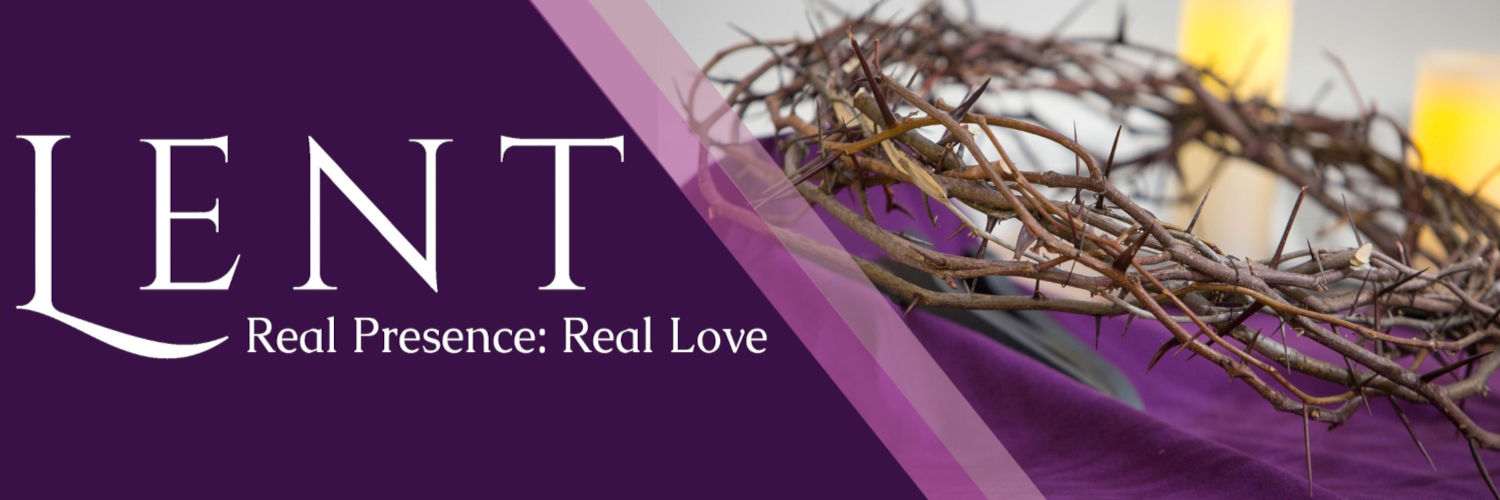Week 1: February 26
This weekend, we listen to two stories of temptation: the temptation of Adam and Eve in the garden and the temptation of Jesus in the desert.
The first reading tells us the all too human story of temptation: not trusting that God is going to give them what they need to be happy, Adam and Eve reach out and grab what they think is going to bring them happiness apart from God.
In the Gospel, Jesus faces the same temptation: the devil offers Jesus the same things her offers us: pleasure, possessions, power and prestige.
Sometimes we respond like Adam and Eve, believing that we need something more than what God offers us in order to be happy. Sometimes, like Jesus, we are able to overcome these temptations and are able to trust that our fullest happiness comes when we say “Yes” to God and to God’s invitation to love.
How can our Lenten prayer, fasting and almsgiving help us to overcome these temptations to seek our ultimate happiness in pleasure, possessions, power and prestige apart from God?
-Chad Griesel, Pastoral Associate
Week 2: March 5
This weekend we hear in the Gospel about Jesus’s Transfiguration. In this story we hear the voice of God say, “This is my beloved Son, with whom I am well pleased; listen to him.” This closely resembles the voice of God at Jesus’s baptism in the Jordan.
This Lent we are called to dig up the things that cause us to sin and to redirect ourselves towards God through prayer, fasting and almsgiving. It becomes a sort of baptism in the sense that we are being made new through Christ, and we must listen to Him to learn how to live for God alone.
As we prepare our hearts to receive Jesus on Easter and renew our baptismal vows, this Gospel reading begs us to ask the question, “Where is God calling us to transform our lives and our hearts so we may exit this Lenten period transfigured through Christ?”
-Sarah Haus, Director of Human Concerns
Week 3: March 12
There are moments in my life when I can really relate to the woman at the well story. There have been times when I have felt left out, avoided family, knew that I had sinned or did not want to deal with people who would judge me. I still have those kinds of days, but not as often. Why? Because, like the woman at the well, I encountered Christ and it changed me! Even though He knows who I am in the deepest, secret recesses of my life, He loves me unconditionally. There is nothing like that kind of encounter with Christ, whose love is deep, real and never-ending.
I had a pastor once who told me that eventually people would stop coming to church unless they encountered Christ when they came. I believed him. Ultimately, our most intimate encounter is with Christ in the Eucharist. Often I encounter Christ in the people I meet in my life – the person on the corner after I get off the freeway, asking me for money, who reminds me that people are still going to bed hungry; the usher at the church door who enthusiastically welcomed me to church even though I had been away from the church for awhile; the reader who had prayed with the readings and helped me hear them with an open heart; the Eucharistic minister who looked me right in the eye and said, “The Body of Christ” – meaning not just the consecrated host, but me! I am a member of the Body of Christ!
Remember when we were not able to gather at church because of the Covid-19 virus? What did we miss? Being able to come to church, be with our faith community and receive the Eucharist. Now that we’re back, may we pray so well and so enthusiastically to deeply encounter Christ in the Eucharist and each other that we can be like the woman at the well who went back to her village and told everyone what she experienced at the well. May we live our lives so that our testimony of God’s love will lead others to be transformed by God’s love as well. Have a good Lent.
Where can you encounter Christ in your daily life?
Do you come to Mass ready to be transformed?
Is your life a testimony for others about God’s love?
-Mary Robertson, Director of Liturgy and Music (Three Holy Women and Our Lady of Divine Providence)
Week 4: March 19
Open the Eyes of My Heart, Lord
We sing about it often. We ask for it in prayer. “…I once was lost but now am found, was blind but now I see.” “Open the eyes of my heart, Lord, … I want to see You; I want to see you.” What is this about blindness? The man in today’s Gospel was physically blind, but nearly as obviously, Jesus rebukes the Pharisees for their spiritual blindness. What does that look like in our world today? How are we called to “Awake, O sleeper” as St. Paul startles the Ephesians in today’s second reading?
Every time these readings occur; I think of Agnes. She was a woman I met on one of my communion calls, years ago. Agnes was blind, but incredibly independent! Yes, her physical blindness affected some of her choices, but none let it become an obstacle to living a full life and seeing the beauty of the world. Agnes loved everyone! Her gentle touch, her blessing on my forehead, helped me see.
What I learned from Agnes and fully believe is that spiritual blindness is more of an obstacle and burden in one’s life. Sometimes we inherit some of these blind spots and don’t even realize it: prejudices, grievances, fears, negativity, etc. Sometimes we hold onto them and hide in the darkness, at least for a while. But, when God’s amazing grace stirs our hearts, watch out! We desire light. We long to see. We ask Jesus to be healed. With God’s help and our efforts, we see more clearly. We are freed to live as children of light.
O God, Source of all light and beauty, remove my blindness and help me to see you more clearly.
-Terri Balash, Director of Pastoral Care
Week 5: March 26
If you’ve spent time with a toddler, you’ll notice that they only move at their own pace, which can either be lightning fast or at a snail’s pace. Going about your day with a toddler can be like trying to get a sloth to move or to slow down a racehorse. Either way, it’s obvious that they are not in your control or going on your schedule. When my three kids were much younger, I found myself challenged almost every day to go with their flow and not let myself get caught up in my own pace or what I thought was the right schedule. I often say that I’m a recovering type-A perfectionist, largely because the last 16 years of parenting have taught me that I have zero control over anything except how I react to life’s circumstances. I’ll admit that it’s been a painful process because it isn’t easy letting go of expectations. But being more go-with-the-flow has left me with a deeper sense of peace and gratitude that has surprised me time and time again.
When I reflect on today’s reading from the Gospel of John, I can’t help but think about how many times Mary and Martha must have said to themselves, “Hurry up, Jesus!” When their brother, Lazarus, was sick they knew Jesus had the power to heal him and immediately sent a message to Jesus that Lazarus was ill. They must have thought that Jesus would come as soon as possible to heal Lazarus, but even after receiving the message, Jesus stayed two days where he was. By the time Jesus made it to Bethany, Lazarus had already been dead for four days. Those days of waiting must have been insufferable and tested the sisters’ faith. They could have fallen into despair, succumbing to doubt about who Jesus is and losing all hope, but when Martha heard that Jesus was near, she ran to meet Him. She said, “Lord, if you had been here, my brother would not have died. But even now I know that whatever you ask of God, God will give you.” (John 11: 21-22). I am struck by Martha’s unwavering faith. Even after witnessing her brother die, she was still filled with hope and knew it was not final, that it was not the end of the story. In her encounter with Jesus, she knew without a doubt that anything is possible with God.
How often do we want to say, “Hurry up, Jesus!” when we expect God to work in our time frame? God is perfect and that also means that God’s timing is perfect. As hard as it can be for us to accept that, we can always have faith and hope in a God who loves us perfectly. In this Gospel reading we see that even after all the waiting, the timing may not have been what Martha expected, but we see that it worked out according to God’s perfect timing with God’s perfect love.
Was there a time when you struggled with God’s timing?
How did you trust God and keep hope alive during times of long waiting?
-Anh Clausen, Director of Family Ministry & Religious Formation
Week 6: April 2 (Palm Sunday)
When I was a little girl, I didn’t care much for Palm Sunday, and not just because the Mass was longer than usual. During the Passion, our church had the congregation read the voice of the crowd. In unison, we’d all cry, “Crucify him!” as the angry crowd did so many years ago. I found this experience deeply unsettling. I thought, But I love Jesus! I don’t want him to die! This is true for all of us: we didn’t ask Jesus to die for our sins, but he did.
This is both a difficult and beautiful part of what it means to be a Christian: Christ chose to die for us. Holy Week is an incredible opportunity for us to reflect upon this reality and accept this sacrifice on our behalf. What if, instead of feeling guilt when hearing the account of Christ’s death on the cross, we could acknowledge and even thank God for this gift of grace? Even in the face of the ugliest pieces of humanity, Christ died for us out of great love. This Holy Week, let’s lean in and marvel in this beautiful gift.
-Meggie Moyer, Director of Liturgy and Music (SS Peter & Paul and Old St. Mary)

